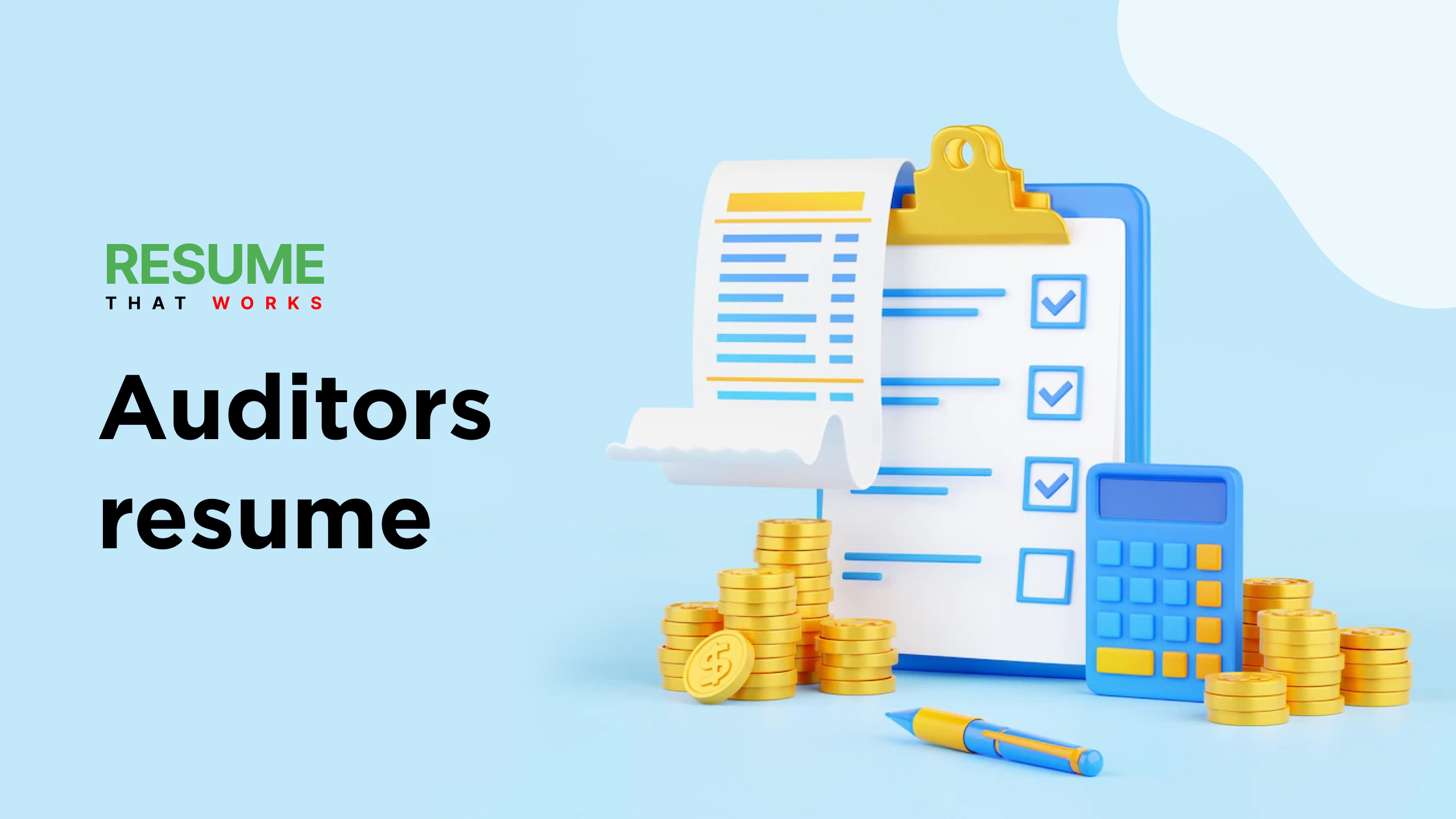Money is the fuel that runs the engine of the modern world. The ancient debate of whether military might or political leverage is better for states has already been settled in the favor of none. It is the financial prowess that determines the fates of the countries in the world.
That’s financial auditing is considered a supreme craft and held in high prestige. Professionals who are adept at crunching numbers and tallying accounts are always in high demand. So, in this post, we will cover what is financial auditing, the skills of auditors, the importance of auditing, and how to write a good auditor’s resume.
Financial Auditing 101
Before moving on to financial auditing, let us cover what is auditing. In simple terms, auditing is about validating and authenticating the truth. It means that an auditor goes through the practices and evidence to determine whether it represents reality or not. In terms of finance, auditing is about going through the financial records of a business and determining whether they are accurate or there was no malpractice or financial misrepresentation in the books.
Skills For Auditors
To get to the bottom of the truth, auditors need to be well-versed in different aspects of record keeping and their modern practices. The obvious and most common skills are accounting and actuarial studies, but the skills also include taxation, compliance, and so on. It is hard to determine the scope and depth of skills for auditors because it varies according to the industry and standards.
Importance of Auditing For Businesses
Auditing is now at the backbone of businesses. As they are in constantly need to know what is going on and how it is being handled, financial auditors are kept busy in their offices. In addition of just crunching numbers and uncovering underlying truths, auditors also provide insights to businesses regarding how to avoid financial mishaps and how to prevent people with malicious intent to do skimming.
Writing A Winning Auditor Resume
Now that we have cleared what is financial auditing and how a financial auditor can add value to a business, it is time to take a look at the process of writing a winning resume. As you are already here to learn the art and craft of an auditor’s resume, let us assume that you have what it needs to populate the resume with the necessary sections.
With that in mind, let us move forward.
-
Choosing The Right Format
Just like the best practices in financial services and auditing, the best practices in resume writing starts and end with the perfect format. Since there is no one size fits all scenario here, you need to keep your situation and demands in mind.
A good format of a resume demands a good opening and closing. So, start with a header that bears your name and contact details and then move on to the subsections of the resume. While writing those, set the margins and font size, and style of your resume to ensure that everything is streamlined.
Studies have shown that recruiters and headhunters only spend a couple of seconds on a resume before accepting or discarding it. And the only thing they can see in this short period is the format and key information on the resume.
-
Composing Resume Summary or Objectives
The resume summary or resume objectives goes at the top of your resume, right under the header. Officially speaking, this is the first section of the resume so it must make a difference for you in the face of other candidates. There is no need to be shy or coy about the case. You are there to get the job done, so you might as well get to the brass tacks. The brass tacks here are the highlights of your past in summary and your future aspirations in an objective.
-
Highlighting Professional Experience Through Job Descriptions
Job descriptions are the best when it comes to showing the recruiters that you are the perfect candidate for the job. Of course, you can rely on academic qualifications and skills to make up for the job responsibilities, but this section indeed makes a big difference. It is because it shows the recruiters that you have hands-on time working with the numbers and formats that you will work with within the intended company. That’s why to showcase your responsibilities and results quantitatively to ensure that they cannot look at any other candidate.
-
Making Academics Section Stand Out
Financial auditing is not a make-shift skill that professionals can learn without spending too much time and effort, especially in a formal setting. The truth is that they require an auditor who is equipped with the academic skills and prowess that can help them and their clients understand and uncover the truth. To do that, professionals need solid academic background, preferably in accounting, mathematics, and statistics. So, you should highlight the landmarks through your alma mater, dates of joining and leaving, and major courses to help recruiters understand your relevance to the job.
-
Showcasing Auditing Skills Quantitatively
The skills sections of a resume are often tricky for young professionals because they do not know how to populate it and make the best of the cases for their candidature. This is an ongoing problem that we will help auditors with to ensure they get the coveted call for the interview. Apart from academic qualifications and job experience, professionals need to showcase their skills through certifications and additional courses. They are now almost standard in the industry as every company spends resources to train and enable their teams. When there is a worthwhile course or skill that you learned during your tenure at a previous or current firm, this is the section to make it pop.
-
Augment Auditor’s Resume With Additional Skills
Auditing is about uncovering truths through numbers. But the job of an auditor is not just that. They need to see the clients, have extensive meetings with them, and understand their needs – even when they are not candid or forthcoming about them. So, apart from core auditing and financial skills, professionals need to have soft skills like communication skills, teamwork, leadership, initiative-taking, and so on.
Sometimes, recruiters are looking for a person who is not only a wizard with numbers but can also start or lead conversations, take the helm and steer the ship with ease.
Excellent Example of an Auditor’s Resume
In this section, we will go through an example of a resume for a senior auditor. This will provide a framework and show you how the best practices are applied in highlighting strengths and covering shortcomings.
Header
John Smith
Senior Internal Auditor
linkedin.com/in/johnsmith
Summary of Qualifications
Current senior auditor with 3+ years at a large corporation with a passion for numbers and a drive for financial truth. Looking to enhance waste elimination capabilities, Certified Public Accountant (CPA) certification, and $50,000+/yearly identified cost savings for clients.
Work Experience
- Senior Internal Auditor
January 2016–March 2019
XYZ Apps, New York, NY
Key Qualifications & Responsibilities
- Issues were identified and communicated to superiors and supervisors.
- Utilized IPA standards to identify, recommend, and implement internal audit procedural enhancements
- Maintaining financial records, preparing tax returns, and conducting periodic audits of accounting books and practices.
- Utilized analytic processes and studies to identify anomalous financial correlations.
- Executed comprehensive financial audits, audits of federal and state compliance, and agreed-upon procedures.
- Developed recommendations for management representation letters and wrote audit reports for management and executive evaluations.
Key Achievements
- Saved over $50,000 per year for clients
- Certified Public Accountant (CPA)
January 2015–January 2016
AED Consultants, New York, NY
Key Qualifications & Responsibilities
- Devised mechanism to minimize financial waste.
- Complied with industry standards and promoted safe and efficient operations.
- Prepared reports for internal audit procedures.
Education
BBA (Concentration in Accounting)
New York University, New York, NY
Graduation: 2016
Relevant Coursework: International Financial Reporting Standards, Managerial Accounting, Financial Accounting, Auditing, Cost Accounting, Accounting Information Systems.
Key Auditor Skills
- Generally Accepted Accounting Principles (GAAP)
- Generally Accepted Auditing Standards (GAAS)
- Financial Auditing
- Risk Management & Mitigation
- Regulatory Compliance
- Analytical and organizational skills
Certifications
- 2019 State of California IPA
Memberships
- Institute of Public Accountants (IPA)
Write A Cover Letter To Tie Up The Narrative
In modern times, it is impossible to convince the recruiter about your candidature through a resume alone. You need a solid case that requires more than just bullets and brass tacks. To show that side of your skills, you need to write a cover letter for the job. A cover letter is a descriptive version of your resume. It covers all the essentials of your career and aspirations but in short and well-crafted paragraphs, instead of bullet points. Professionals who are seeking jobs in the corporate world should send out a cover letter with their resumes, even when the recruiter does not ask for it. This is another sure thing that will help them stand out.
FAQ
What should an auditor put on a resume?
A resume is a summary of the past and present of the professional. An auditor should put the following information on the resume:
- Contact details
- Work experience
- Academic qualifications
- Special Skills
What is an auditor job description?
The auditor job description summarizes the role and responsibilities of the previous jobs. This is done by naming the position, the time you spent in that position, and what were the responsibilities and outcomes of your stay there.
What are auditor skills?
Auditor skills are the capabilities of a professional to get to the truth through numbers and financial practices. Professional auditors learn and hone their auditor skills through practice and certifications.
How do you describe internal audits on a resume?
Internal audit is about improving an organization’s operations through cost-effective measures. The best way to showcase internal auditing skills is by highlighting the sum you helped the company save.
What are the most desirable attributes an auditor should possess?
Here are the three top qualities that an auditory should have:
- Professional integrity
- Communication skills
- Financial acumen
What are the most important duties of an auditor?
The rundown of the important duties of an auditor:
- Preparation of audit report
- Form an opinion
- Make inquiries
- Assist others
- Comply with auditing standards




